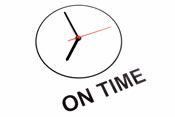 When it comes to following up after interviews, there is a fine line between being persistent and being annoying. Most people know the basics like sending a thank-you note and calling to check on the hiring process, but here are three new tips to stand out, in a good way, with your interview follow up.
When it comes to following up after interviews, there is a fine line between being persistent and being annoying. Most people know the basics like sending a thank-you note and calling to check on the hiring process, but here are three new tips to stand out, in a good way, with your interview follow up.
1. Ensure appropriate follow up.
This part of the application process begins during your interview. Be ready to take notes during the interview and ask specific questions about who is involved in the hiring process, what the steps are in obtaining a position, and the timeline looks. Make sure your follow up is in alignment with their process. Also, if during the interview you’re asked to take some additional steps in the application process, like taking a personality test, completing a drug-screening, or providing work samples, make sure you write down when you’re expected to do that by and how you are to touch base once that is completed. Often an interviewer will ask for more information on part of your work history or for you to provide a list of references. And sometimes, you’ll be asked to complete a task as part of the interview process. Your ability to complete the tasks as requested is also part of your interview, so take it as seriously as the face-to-face interview. Not following up as instructed could make the interviewer question your interest in the position and your ability to follow through.
2. Always add value when you follow up.
Instead of just sending a thank you note, include a highlight of what interested you most about the position and what you found exciting about the company. Share a thought of how you saw yourself working in the role. For example, if it’s a job in engineering, share specifics on design and technology developments you recently read about that you think would be applicable. Another way to provide value is to invite the interviewer to join you for an upcoming networking or industry trade event. If you’re active in a professional association, include something like, “I hope to see you next month at the downtown Society of Human Resource Management meeting. I’m excited to hear from the guest speaker on leadership traits and time management styles.” It’s always good to reinforce your personal professional development plan and encourage further networking.
3. Network for the long term.
No doubt in your job search you’ll go on several interviews before the right job opportunity comes along. Think of the interview process as a way to build your network for two reasons. First, while you may not get the job you applied for, other openings may come up in the future that drive the company to return to their pool of already-interviewed candidates. Second, the person you interview with may move on to another opportunity and you could find yourself working with them somewhere else or interviewing with them again. A few ways to make connections with individuals you interview with include sending a LinkedIn connection request, keeping a personal file of names and contact information of everyone you’ve interviewed with, and following up with contacts after you’ve found a job. Once you’ve landed a new job, it is appropriate to send out an email or LinkedIn message letting people you interviewed with know where you’ve accepted a position and what your new role is. Be sure and thank them again for the time they spent with you. Additionally, if you hear that a company you interviewed with celebrates a milestone or receives an award, especially specific to your industry, make sure to reach out again to congratulate them.
Getting the interview is your opportunity to connect and shine, and following up after the interview is your opportunity to show your diligence and communication skills. In your career development, always be thinking of ways you can add value to other professionals, create a larger network, and develop your professional reputation.
What are some unique ways you’ve followed up after an interview?
By Rachel Rudisill



 In a
In a 

